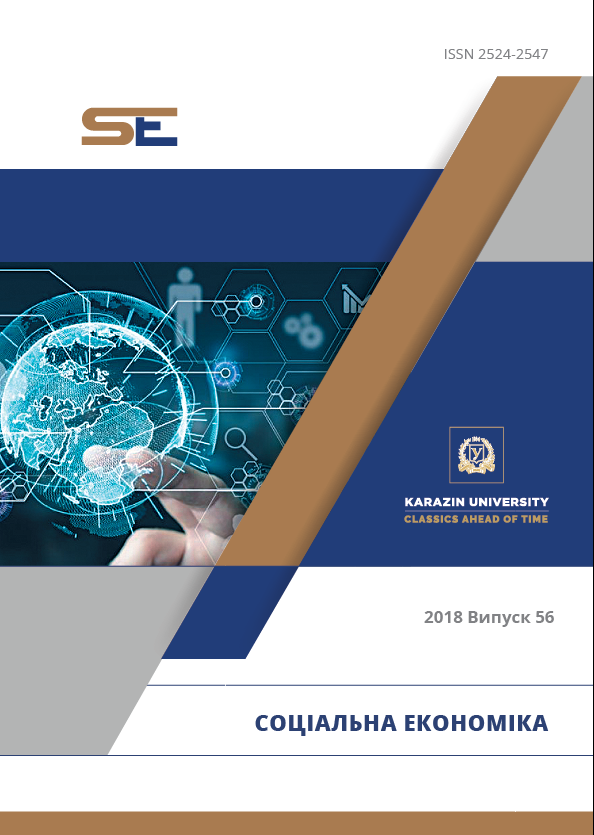The Analysis of the Interpretation and the Essence of Green Logistics
Abstract
The article is devoted to the analysis of various interpretations of green logistics, which are similar in content and do not contradict each other, but only reflect the point of view of various experts on the same problem: recycling logistics, secondary management logistics of an enterprise, recycling logistics, waste logistics, reverse flow logistics, reverse logistics, eco-logistics, reverse supply chain management, return flow management. The lack of terminological unity makes it necessary to create a classification with regard to different definitions related to the interpretation of this concept in modern approaches to the interpretation of green logistics. The analysis of the various interpretations of green logistics found that in green logistics it is necessary to distinguish two functional areas: logistics of return flows of goods and logistics of waste (logistics of recycling).The purpose of the article is to analyze the interpretation of green logistics and to examine the essence of green logistics for solving management control problems, analyzing and effectively managing the movement of returned, damaged, expired and used goods, production and consumption waste, which starts from the point of their formation to the point of disposal or recycling reduce production waste and costs from returning goods.The objectives of the study are to create a classification of various definitions related to the interpretation of green logistics and the study of the main goal, objectives, functions and principles of green logistics.This research is conducting in the field of green logistics is very important for the conditions of Ukraine, since it is our country that is among the states with the most relative and absolute indicators of waste generation and accumulation. Therefore, the essence of green logistics considering at the micro level, it should be noted that green logistics is associated with the effective management of the flow of returned, damaged, expired and used goods, production and consumption waste both in the forward direction and in the opposite direction and will improve the results of enterprises for expense of saving material resources and reducing the expenditure indicators of the enterprise.
Downloads
References
Smirnov, І. G. (2002). Green Logistics: ecological and geographical view [“«Zelena logisty`ka»: ekologo-geografichny`j vy`mir”]. Ukrainian Journal of Geography, 2, pp. 49–52.
Grigorak, M. Yu.and Varenko, Yu. V. (2014). The principles of green logistics in activities of logistics providers [“Printsipy “zelenoy” logistiki v deyatel’nosti logisticheskikh provayderov”]. [online] Available at: http://www.at icmd.md/wp content/uploads/2014/04/V_2_17_ _MMOTI_Grigorac_Varevko_.pdf [Accessed 10 Nov. 2018].
Chornopy`s`ka, N. V. (2014). Green logistic: thermal aspect [“Zelena logisty`ka: terminologichny`j aspekt”]. Problems of training professional personnel in logistics in a global competitive environment. K.: Logos, pp. 274-276.
Chortyuk, Yu. V. (2007). Ecological strategy of logistics of trading enterprises [“Ekolohichna stratehiya lohistychnoyi diyalnosti torhovykh pidpryyemstv”]. Prometheus: regional collection of scientific papers on economics, 2(23), pp. 226–229.
Nikolaeva, E. G. and Melnikova, N. V. (2013). Reverse logistics is an innovative direction in managing reverse material flows [“Reversy`vna logisty`ka – inovacijny`j napryamok v upravlinni zvorotny`my` material`ny`my` potokamy`”]. Innovative and Information Technologies in the Development of the National Economy: Theory and Practice: Monograph; ed. T. S. Klebanova, V. P. Neftehina, E. I. Shochina. M.: Scientific Technologies, pp. 214–220.
Rogers, D and Tibben-Lembke, R. (2001). An examination of reverse logistics practices. Journal of Business Logistics, 22(2), pp.129-145.
Kummetsteiner,G. (2018). Handbuch der ÖkoLogistik. [online] Available at: https://www.oth-aw.de/kummetsteiner/weiterbildung/#oekologistik [Accessed 10 Nov. 2018].
Rodrigue, J-P., Slack, B. and Comtois, C. (2001). Green logistics (the paradoxes of). The handbook of logistics and supply chain management. London.: Pergamon, pp. 339–350.
Janbo, L. and Songxian, L. (2008). The Forms of Ecological Logistics and Its Relationship Under the Globalization. Ecological Economy, 4, pp. 290–298.
McKinnon, A., Browne, M., Whiteing, A. and Piecyk, M. (2015). Green Logistics: Improving the environmental sustainability of logistics. 3nd ed. London: Kogan Page.
Zhuravskaya, M. A. (2015). Green logistics is a strategy for success in the development of modern transport [“Zelena lohistyka – stratehiya uspikhu v rozvyku suchasnoho transport”]. Bulletin of the Ural State University of Communication, 1(25), pp. 38–48.
Tambovtsev, A. and Tambovtseva, T. (2011). Green Logistics for Sustainable Development [“Zelenaya logistika dlya ustoychivogo razvitiya”]. Governance and sustainable development, 2(29), pp. 197–203.
Evtodieva, T. E. (2018). Green logistics as a component of the concept of shared responsibility [“Zelenaya logistika kak sostavlyayushchaya kontseptsii obshchey otvetstvennosti”]. Bulletin of UYrGY. Series of «Economics and Management», 12(1), pp. 167–174.




